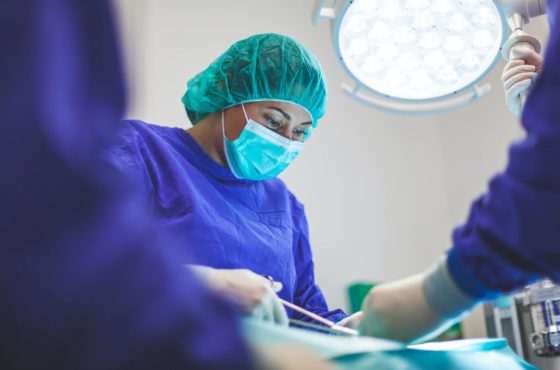Surprisingly, one of the most common complications that patients have after a hernia mesh surgery is hernias coming back.
Doctors call this hernia recurrence.
To overcome this problem, surgeons started using a medical device called hernia mesh. The idea is that the hernia mesh is meant to prevent hernia recurrence from happening.
However, because of defective hernia mesh implants, we still cannot call recurrent hernias a thing of the past.
In this article, you will learn more about the causes, symptoms, and how you can be treated for a recurrent hernia.
What is a Hernia Mesh?
A hernia is a common medical problem that occurs when an organ or tissue squeezes through a particularly weak spot in the abdominal wall.
Hernias can be caused by anything that puts increased pressure on the abdomen, including lifting heavy objects, coughing, obesity, constipation, diarrhea, damage from an injury, and more.
The most common type of hernia is the inguinal hernia which occurs when a tissue, such as a part of the intestine, protrudes through a weak area in the abdominal muscles.
Inguinal hernia occurs at the inguinal canal — the crease between the lower abdomen and the leg. These hernias commonly occur in men or pregnant women.
The surgery used to fix a hernia is called a hernia repair.
For many years, the use of hernia mesh in a hernia surgery has been the acceptable standard of care.
In fact, every year, more than 100,000 hernia mesh devices are implanted in the United States alone.
But despite being a popular go-to by surgeons, complications related to the mesh have been making rounds lately.
The truth?
This medical device actually has a slew of lawsuits under its name.
Plaintiffs in the hernia mesh lawsuit reported numerous side effects after having their hernias repaired with a surgical mesh.
Some of the more common injuries linked to these medical devices include adhesions, bowel obstruction or perforation, nerve damage, fistula, and hernia recurrence, among others.
And even though the U.S Food and Drug Administration considers hernia mesh safe, the amount of medical device implants which have been recalled for various medical reasons says otherwise.
Hernia Repair
Hernia repair is a common surgery in the United States.
In fact, more than a million hernia mesh surgeries are done in the country each year.
Around 800,000 of these are done to treat inguinal hernias.
In some cases, treatment to fix hernias can be non-surgical. This involves observing and waiting to ensure that the hernia is not getting larger and is not causing complications.
If not treated properly, a sever hernia may lead to strangulation of tissues, bowel obstruction, and other complications which could potentially be life-threatening.
On the other hand, surgical methods for hernia repair can either be done through the minimally invasive laparoscopic surgery, or the open repair surgery.
So how does the two differ?
If your hernia was repaired with the laparoscopic surgery, your doctor made several small incisions near the abdomen or the hernia to strengthen the weak area. This is why this operation is called minimally invasive, or only involves minimal damage of body tissue.
On the other hand, if your hernia was repaired through an open surgery, then your doctor most likely made a single and larger incision near the location of your hernia in order to repair the weak muscle.
On the other hand, if your hernia was repaired with the laparoscopic surgery, your doctor made several small incision near the hernia to strengthen the weak area. This is why this operation is called minimally invasive, or only involves minimal damage of body tissue.
Because of this, laparoscopic surgery also means less downtime and recovery for most patients.
Either type of surgical approach to fix hernias can be done with or without using a hernia mesh device.
A surgical hernia mesh is used to patch a hole or reinforce a weak muscle after a patient suffers from hernia.
These medical devices are made by a number of manufacturers including Bard, Ethicon, Covidien, and more.
Can You Get Another Hernia After Mesh Repair?
Hernia recurrence occurs when the hernia of a patient returns after they have had a hernia surgery with the use of a surgical mesh.
The main reason surgeons perform hernia repair with mesh is to reduce the chances of hernia recurrence.
However, the use of mesh does not guarantee that hernias will not occur again.
In fact, in some cases, its use has actually increased the chance of patients of suffering from hernia recurrence due to defective mesh devices.
Some hernia mesh complications such as adhesion, migration, bowel obstruction, fistula, and perforation, may also lead to hernia recurrence.
What are the Symptoms of Hernia Recurrence?
If you’ve had a hernia repair using surgical mesh, it is important to be mindful of any pain and discomfort that you might experience immediately after your hernia mesh surgery, and even after years later.
A recurrent hernia can even occur and cause problems years later.
Some of the symptoms of hernia recurrence include:
- pain
- constipation
- a bulge at or near the site of previous surgery
- nausea
- infection
- vomiting
- loss of blood supply in the intestines
If you think you are experiencing pain, discomfort, infection, and other symptoms of hernia recurrence, call your doctor immediately as these symptoms may be related to the hernia repair you had.
Medical attention is necessary for any patient having these symptoms as there are a myriad of complications associated with hernia recurrence.
Risks Associated with a Recurrent Hernia
Risks associated with hernia recurrence can either be an infection or the risk of having another surgery for a recurrent hernia.
An infection can start near the site of your hernia, but it may also not. This infection can get serious and may possibly lead to life-threatening conditions if left untreated.
An infection may come with swelling that is warm or tender to the touch. It may also be accompanied by headaches, fever, and nausea or vomiting.
It is important to immediately tell your doctor if you are having these symptoms, as your doctor can identify an infection and tend to it properly.
An infection that’s left untreated can make your condition worse and may be harder to treat.
On the other hand, the complications associated with the surgery for a recurrent hernia can be serious.
A surgery to address a recurrent hernia is much more complicated compared to the first hernia mesh surgery that the patient had, as the surgeon must tend to the hernia as well as the complications the patient is currently experiencing from the initial hernia repair.
The surgical mesh will also have to be removed. However, another problem with this medical device is it can migrate to other organs, which can make mesh removal more complicated for your surgeon.
A surgery for a recurrent hernia may also put the patient at an increased risk of infection and longer recovery time.
Can You Have Hernia Surgery Twice?
Today, most studies have shown that the use of mesh for hernia repairs reduces the rate of hernia recurrence compared to hernia repairs performed without hernia mesh.
However, recurrent hernias can still happen, and once they do, it will necessitate another surgery for the patient.
Hernia recurrence may also have a varying degree of possibility that can depend on the procedure done on the patient.
For instance, traditional hernia surgeries that simply stitch the hernia close and do not make use of hernia mesh have been known to cause recurrent hernias in patients.
This is because the tissue around the suture can become weak over time and abdominal stress can eventually tear the tissue completely.
On the other hand, hernia repairs that make use of the mesh, also called the tension-free option, do not make use of sutures to close the hernia. Rather, the hole is covered with the surgical hernia mesh.
These mesh-based surgeries have a lower risk of causing recurrent hernias.
In fact, The Renaissance School of Medicine at Stony Brook University says that before hernia mesh was developed, hernias returned in around 50% of cases.
But after hernia mesh was introduced to be used for hernia repair procedures, the rate of hernia recurrence dropped to just 10%.
How long Does Mesh Hernia Repair Last?
Studies have mixed results on how long a hernia repair can last.
Before the invention of the hernia mesh, recurrent hernias used to be the most common complication among patients who had mesh repair.
A 2014 study published in JAMA Surgery looked at 190,000 hernia surgeries. The study found that hernia recurrence only occurred in 2.7 percent of hernia mesh surgeries, as compared to 8.2 percent of surgeries that used stitches alone.
However, a 2016 study in JAMA had conflicting results.
The study looked at 3,242 patients. Researchers were able to find that there was an increased risk of having hernia mesh problems in the first five years after a hernia repair surgery.
What are the Symptoms of Hernia Mesh Failure?
You can tell that your surgical hernia mesh has failed once you begin to experience symptoms immediately or even years after hernia surgery.
Below is a list of hernia mesh failure symptoms you should watch out for:
- severe pain
- high fever
- nausea and vomiting
- bruising and swelling
- difficulty urinating and passing gas and stool
- inflammation around the surgical site
If you happen to notice these symptoms, you should talk to your doctor immediately.
The risks associated with hernia mesh repairs can be difficult for patients to diagnose alone. You should tell your doctor that you are having these symptoms and that you had a surgery to fix your hernia using mesh.
How Can I Report Hernia Mesh Complications to the U.S. Food and Drug Administration?
One way to make the regulating agency aware of adverse events or complications from the use of surgical hernia mesh is by asking an attorney to file a hernia mesh lawsuit against the manufacturer of the allegedly defective medical device.
Once a complaint is filed against a manufacturer, the company has the responsibility of reporting the lawsuit to the FDA.
And more lawsuits filed mean more chances of the agency having a second of third look at the medical device as well as the complications that a certain patient reported against it.
In case of a defective hernia mesh implant failing three years after surgery, if the same surgeon who implanted the mesh also removes it, then they should report the injury caused by the medical device to its manufacturer.
And if these surgeons continue on filing reports of serious injuries or side effects to companies, the manufacturers have a legal obligation to inform the regulatory agency about the situation.
If you or your loved one has suffered from serious injuries with the use of hernia mesh implants, you may be eligible for compensation. Contact us today and we can provide you with the legal blueprint that comes with the next steps you can take in fighting for your rights.



